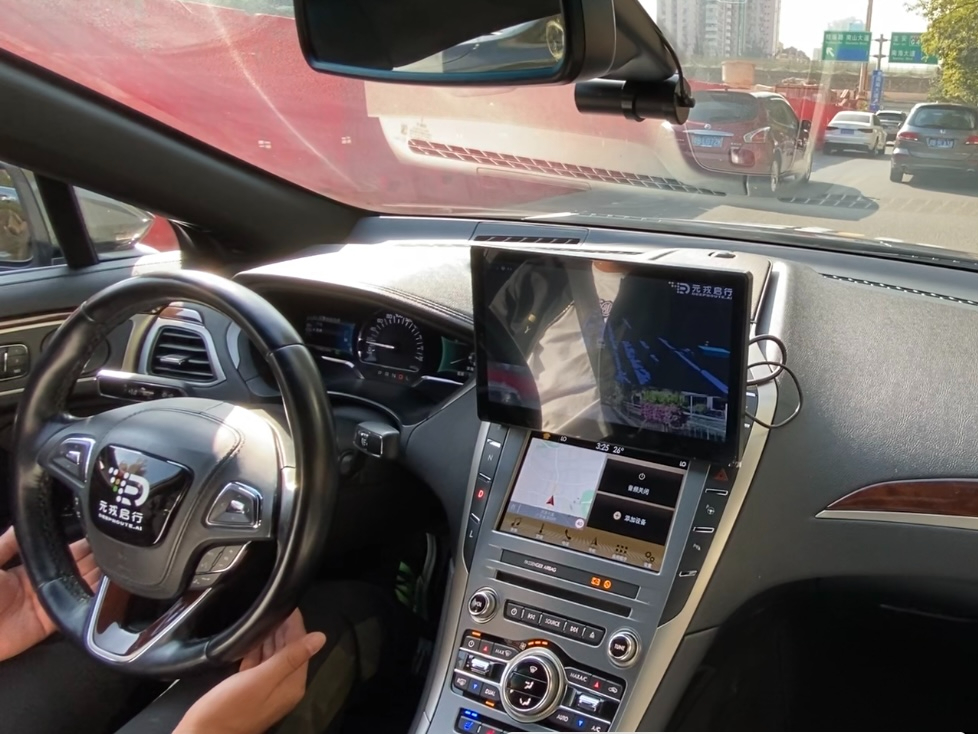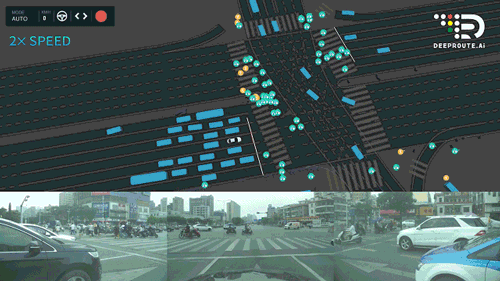Riding a self-driving car for the first time requires a dose of faith. You have to convince yourself that you are absolutely safe, that the car can take care of itself, and its passengers, otherwise you will find yourself ill at ease when a pedestrian suddenly crosses the road or the traffic gets more tangled than expected.
But cruising on a black Lincoln powered by autonomous driving technology startup DeepRoute.ai proved an uneventful affair. While being seated beside the driver was definitely out of my plan, it was a smooth ride all throughout a 10-kilometre stretch of one of the busiest thoroughfares of Nanshan District in Shenzhen, the heart of China’s Silicon Valley, the car slowing to a stop when the traffic backed up or when the red light was on at intersections, changing lanes when the coast was clear, braking just in time when a delivery bike suddenly cut it off, and manoeuvring perfectly into a parking spot. It would have passed a practical driving test with flying colours.
DeepRoute is one of the self-driving companies that have secured regulatory approval to run tests in urban areas, but a safety officer is required to take the driver seat. "When Li Shufu, the chairman of Geely, came for a ride in our self-driving car, he said it felt like riding with an old hand who has five years of driving experience," says the safety officer while keeping an eye on the road, his hands off the steering wheel.
Although the prediction that millions of self-driving cars would have been on the road by 2020 has proved a bit too optimistic, developments in the field are quite encouraging. There have been a few well-publicized accidents involving self-driving cars, such as the death of a pedestrian in Tempe, Arizona, in 2018, who was hit by an Uber test car manned by a safety driver watching a popular TV show, but autonomous driving trials have been continuing since then.
And investors, realizing the huge opportunities opening up in the sector, are eager to place their bets. In China alone, self-driving companies secured around 100 billion yuan (US$15.48 billion) in investment last year, according to market estimation, and the momentum is likely to continue this year.
“Investors have never been this active. Since late last year, we have been getting inquiries from investors frequently. Even when it was close to the Lunar New Year holidays, we were still being visited by investors almost every day,” Nianqiu Liu, partner and vice president of DeepRoute.ai, tells The Asset in an interview.

Pre Series-A funding
Founded in 2019, DeepRoute has been able to expand quickly after securing US$50 million in pre Series-A round in the same year of its establishment. It was not as easy as it sounded, however. “We faced the same challenges as the market at that point. It was difficult to raise money,” Liu recalls.
Since 2018, Chinese startups have seen a decline in funding. According to Zero2IPO Research, more than 40% of firms funded by private equity and venture capital in the country were not able to raise more than 100 million yuan in 2020, and total funding raised during the year dropped 3.8% to 1.197 trillion yuan, compared with the previous year. “Investors tend to be selective against this backdrop,” says Liu.
However, investor interest in the self-driving industry has remained strong.
In addition to its existing investors like Fosun RZ Capital, Yunqi Partners, Green Pine Capital Partners, and Ventech China, local Chinese investors are also reaching out to DeepRoute.
“For those investors with a tech or automotive background, we seek tech support and strategic partnership in the future,” says Liu, adding that they also welcome financial investors.
Road tests
A crucial part of its technology consists of a slim, water-resistant rooftop box that houses three lidar sensors (which use laser light to measure distances), seven high dynamic range (HDR) cameras, a global navigation satellite system (GNSS), an inertial measurement unit (IMU), and a synchronization controller, enabling the vehicle to accurately detect objects at a range of 140 metres.
Since its founding, DeepRoute has conducted road tests in various places in Shenzhen, Wuhan, and Hangzhou, and has used various car models including Lincoln MKZ, Dongfeng E70, and Geely Geometry A. These tests have enabled the company to bring diversity to its data and enhance its technology.
In January, at the virtual CES trade show, the company unveiled DeepRoute-Engine, a solution that analyzes data from various sources, offering “a six times faster inference process than other open-source deep learning frameworks” for Level 4 self-driving technology, which refers to a vehicle that can drive by itself under certain conditions and specific locations. The idea is that the faster the technology can process data, the safer it will be for a self-driving car.
Local investors who have reached out to DeepRoute already have a good understanding of the market, according to Liu. Most of them are convinced that the commercialization of self-driving vehicles is an inevitable development.
The company is also attracting the attention of overseas family offices, especially those with subsidiaries in Hong Kong. “They might have different views on self-driving sector, but we are happy to exchange ideas with them,” says Liu.

Ride-hailing
One promising market for the application of self-driving solutions is the ride-hailing business. DeepRoute is currently conducting robo-taxi test drives in Wuhan in collaboration with Dongfeng Motors, and in Hangzhou in partnership with Caocao Mobility, an electric vehicle ride-hailing service provider backed by Geely.
The alliance with Caocao is expected to culminate in the deployment of self-driving vehicles during the 2022 Asian Games in Hangzhou. Caocao will integrate DeepRoute’s technology into its dedicated fleet of Geometry A fully electric vehicles during the multi-sport event. Athletes and guests will be able to use Caocao’s app to hail the robo-taxis to get around the event sites.
On top of the online ride-hailing market, DeepRoute is also exploring the possible deployment of its technology in transportation in ports. The company is collaborating with a container terminal company owned by Cosco Shipping to provide self-driving solutions towards establishing a 5G smart port in Xiamen.
Life cycles
Self-driving technology was one of the key themes that investors favoured back in 2016 and 2017, although the market was relatively muted in 2018 and 2019.
“All technologies have their own life cycles,” Liu explains. “When a certain technology first emerges, the market is full of imagination and expectation. Therefore, investors tend to have a very positive outlook. As the technology further develops, people will have a better understanding of it, and then the market might notice that this technology cannot meet the market’s expectation in the short run. It might take a longer time to commercialize it. That is when it comes to a slowdown in the life cycle.”
The self-driving sector has passed those phases, and reached a point of no return. According to McKinsey’s research, China is expected to be the world’s largest self-driving market in the long run, and the mass adoption of highly autonomous vehicles is likely to start in the country in 2027.
“Now that the investors see the possibilities of commercializing autonomous driving, the outlook for this market is unlimited – it depends on how fast the technology can further be improved and provide even better solutions and services,” Liu says.









